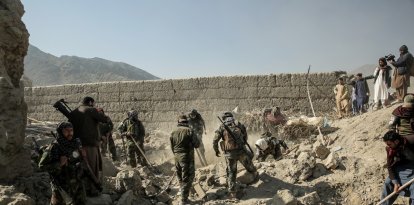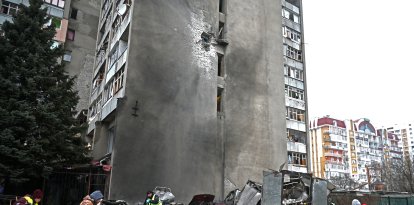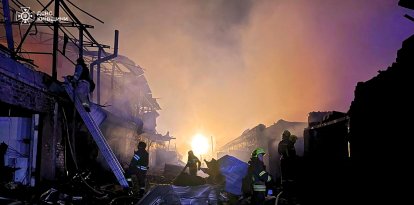There Goes Latin America: Iran's Regime in America's Backyard
The Iranian regime, which... has been calling for "Death to America," now has ballistic missiles which it says can reach the US, and claims to have a hypersonic missile that, according to one report, "Can Destroy US In 40 sec."

Bandera de Irán / AFP
A threatening development has been brewing largely under the radar of the Biden administration and the mainstream media attention: Iran's calculated expansion into Latin America, from Argentina to Mexico.
With alarming nonchalance, the Biden administration appears to have turned a blind eye to the Iranian regime's concerted efforts to establish a military foothold right in America's backyard. The ramifications of this complacency are profound. The Iranian regime, which, since it began in 1979, has been calling for "Death to America," now has ballistic missiles which it says can reach the US, and claims to have a hypersonic missile that, according to one report, "Can Destroy US In 40 sec."
Historically, Iran's playbook in the Middle East involved the arming and sponsoring of proxies and terror groups such as Syria, Hezbollah, and Hamas, with the ultimate aim of annihilating Israel and has carried out more than 180 attacks just since October 7 on US interests in the region.
Now, Iran now seems to be mirroring its same "ring of fire" policy to threaten the United States from Latin America. Iran, for instance, has been cozying up to like-minded socialist regimes such as Venezuela, Nicaragua, Bolivia, and Cuba, and providing them with weapons and military support, seemingly with the sinister objective of posing a threat to the United States.
Venezuela, near the US, emerges as a key player in Iran's Latin American ambitions. As a potential launching pad for attacks on the US, Venezuela appears to have willingly embraced Iran's overtures. Reports from sources such as ProPublica have highlighted the establishment of a joint intelligence program between Iran and Venezuela. This cooperation would encompass arms trafficking; issuing IDs, passports and bank accounts; intelligence sharing, and logistical support. The Venezuelan Armed Forces, with Iranian assistance -- indicating a dangerous escalation in their military capabilities -- have also integrated armed drones into their arsenal.
Iran's growing military capabilities, with ballistic missiles and armed drones capable of reaching states such as Florida, Georgia, Alabama, Louisiana and Texas from Latin American soil, already pose a direct threat to the United States.
The Iranian regime, in addition to Venezuela, has evidently also been exploring avenues for military cooperation with Nicaragua and Cuba. Both appear to have fallen under Iran's sway. Iranian President Ebrahim Raisi's visit last year to those nations underscored the deepening ties between Iran and its Latin American partners. Iranian warships docking in Brazil shortly after President Luiz Inácio Lula da Silva's inauguration also signifies Iran's intent to expand militarily in the region and sets a precedent that should be a concerning for what appears increased collaboration between Iran and more Latin American countries.
Another troubling development is Bolivia's recent defense agreement with Iran, one that includes the transfer of drones. Bolivia's alignment with Iran should raise alarm bells about the potential for proliferation of Iranian military technology across the southern hemisphere. As Raisi emphasized during his recent visit, the cooperation agreements signed with Venezuela, Nicaragua, and Cuba span various sectors, from energy to biotechnology - highlighting the multifaceted nature of Iran's infiltration of Latin America.
Additionally, recent reports of four Iranians apprehended trying to cross the US-Mexico border, who were considered a terrorist threat, add another dimension to the urgency of addressing the Iranian threat in Latin America. This incident serves as a distasteful reminder of the potential consequences of allowing Iran to establish a foothold in America's vicinity.
Latin American countries have also been serving as fertile ground for Iranian covert intelligence operations and terror groups, with Venezuela emerging as a particularly troubling case. Revelations linking Venezuela to the issuance of passports to individuals associated with terrorist organizations such as Hezbollah raise serious questions about the extent of Iran's influence in the region and its ramifications for U.S. security.
US Rep. Maria Elvira Salazar pointed out that, instead of turning a blind eye to this new geopolitical romance, the Biden administration should actively support political forces that share its commitment to combating terrorism and promoting regional stability. She added:
"Iran has been aggressively strengthening its ties to the Western Hemisphere through like-minded socialist regimes in Venezuela, Nicaragua and Cuba. They are also looking for opportunities elsewhere, and it's no coincidence that Iranian ships are docking in Brazil just a month after a socialist retook power in the country."
Iran's involvement in past terrorist attacks, such as bombing the Israeli Embassy and Jewish community center in Buenos Aires, are also examples of the dangers by Iran's expansionist agenda. Iran's vows since 1979 of "Death to America" - coupled with its fondness for terrorism and its new chumminess with China and Russia, both hostile to America -- should also be cause for concern.
The Iranian regime's efforts to expand its military strongholds and the presence of its terror groups in Latin America should be seen as forming a clear and present danger to US security. Iran's activities, from arming adversarial regimes to fueling anti-American sentiments, demand urgent attention. Failure to confront Iran's encroachment so close to North America could have catastrophic consequences. It is critical to recognize now the gravity of this exponentiating national security threat.

























